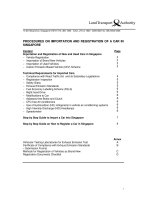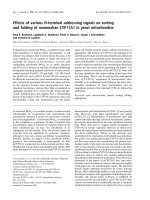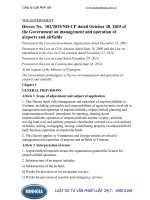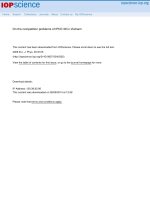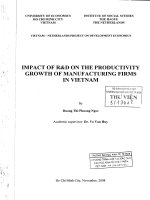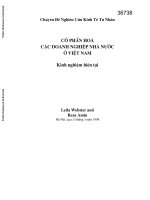Information openness on organization and operation of state apparatus in Vietnam
Bạn đang xem bản rút gọn của tài liệu. Xem và tải ngay bản đầy đủ của tài liệu tại đây (56.3 KB, 8 trang )
42
Social Sciences Information Review, Vol.11, No.3, September, 2017
Information openness on organization and
operation of state apparatus in Vietnam
Trần Văn Duy
PhD., Institute of Lexicography and Vietnam Encyclopedia, Vietnam Academy of Social
Sciences
Email:
Received 26 December 2016; published 25 October 2017
Abstract: Awareness of democraticness for people to participate in control and supervision of
the Party and state apparatus is a thorough awareness manifesting the democraticness of
socialist state of rule of law. However, to promote the democracy, ensure the power to be of
people, build successfully the state of rule of law to be truly of people, by people and for people,
it needs to effectuate various solutions. This paper clarifies somewhat the legal situation of
information openness on organization and operation of state apparatus in order to implement
the direct democracy today, and thence puts forth some recommendations to change the
awareness of information openness on organization and operation of state apparatus.
Keywords: Control of state power, Transparency of information, Openness of information,
State apparatus.
1. Introduction
Information openness on organization and
operation of state apparatus to effectuate
the direct democracy originates in the
doctrines of control of state powers.
Because, there is true democracy only
when the state power is controlled and
limited by democratic institutions, people
being allowed to participate in social
processes. In reality, organization and
operation of Vietnamese state apparatus
have still insufficiencies, unsatisfying the
comprehensive requirements of good, open
and transparent governance.
Annually, Transparency International (TI)
evaluates the transparency index of each
country by analyzing the regulations of
laws, the law enforcement, and measures
the feelings of people, on the basis of these
indexes, countries in the world are to be
ranked. On the basis of rank change during
several years, one can evaluate the advance
or lagging of each country. According to the
survey on South-East Asia, Singapore is in
the first rank of the region and is of the top
group of the world. The next come Brunei
(38th rank), Malaysia (53rd), and a group
consists of Thailand, Philippines, Indonesia,
Information openness…
Vietnam (from 80th to 120th rank) (as cited
in Đặng Hùng Võ, 2015).
In current conditions, renovation of state
apparatus is an important measure to build
the Vietnam socialist state of rule of law of
people, by people and for people. To build
the state of rule of law is a process of
proactive and self-conscious renovation of
Vietnam state apparatus from bureaucratic
concentrative administrative mechanism to
an apparatus of social management by
laws. A good state apparatus is the one that
permanently provides every individual and
social organization with exact information,
and the information must be complete, easy
accessible and understandable for the
purpose of the construction of a society with
wealthy people and strong democratic, just
and civilized country.
2. Legal situation of information openness
on organization and operation of state
apparatus for the purpose of current
implementation of direct democracy
First, the formation of legal system of
information access in the direction of
“open government”, having high openness
and transparency on organization and
operation in order to meet effectively the
needs of citizens and businesses who still
encounter many difficulties due to the fact
that there is not effective and comprehensive
legal mechanism yet for people to exercise
their rights.
Right to know is one of basic rights of
man, belonging to the group of civilpolitical rights that were recognized by the
Universal Declaration of Human Rights in
1948. In recent international integration
process, Vietnam Communist Party and
State always pay importance to human
rights and have the concrete measures to
43
ensure the incessant enhancement of right
of people to information access,
considering this as an effective solution
for ensuring the enforcement of human
rights in Vietnam, as well as manifesting
active attitude about international
integration in the trend of defending
human rights and peace. However, the
exercise of right to information of
Vietnamese people in comparison with
other civil-political rights still encounters
many difficulties due to the lack of
effective and sufficient legal mechanism
for people to implement their right. In
fact, in Vietnam, only until the 1992
Constitution when the right to information
was referred in the regulation that: citizens
“have right to be informed”. Before, in the
1946, 1959 and 1980 Constitutions there
was no regulation on right to information.
After enforcement of the 1992 and 2013
Constitutions, many promulgated legal
acts have the regulation on the right of
people to be informed and responsibility
of state institutions to provide information
kept by state. Some central authorities
have been invested with duties of
releasing information including :
i) Head of supreme authority must
effectuate the regulation on providing the
people with information as the Article 72
of 2013 Constitution states: Laws and
resolutions of National Assembly must be
certified by its Chairman and promulgated
by country President after at least fifteen
days since the adoption by Assembly.
Head of central executive organ must
effectuate the mission of reporting to
people the important issues through
reports of Government to National
Assembly, responses of Government to
44
Social Sciences Information Review, Vol.11, No.3, September, 2017
interrogations of members of Assembly
and to mass media.
ii) Authorities are obliged to implement the
principles of openness and transparency in
the activities of its organs and institutions,
except for the issues that are related to state
secret and other issues according to
regulation of Government. Openness of
information would be effectuated by
various measures, among which the press is
the most effective instrument.
iii) The 2007 Ordinance on implementing
democracy in commune, precinct and
district-level towns regulates that socioeconomic information about projects of
investment, duties and rights of officials...
must be posted openly at office of commune
People’s Council and Committee, on
commune’s radio and through the commune
heads and heads of civil groups.
Thanks to these legal regulations, people
have been actually allowed to access to
information on certain concrete domains
such as: policy- and lawmaking, resolution
of requests of citizens, operation of state, in
justice and press sectors.
Secondly, system of regulations on
responsibility of state organs for opening
their information about state management
was paid attention, but these regulations are
still dispersedly kept in certain special legal
normative acts and on some concrete
domains, and they define the right of press
to ask the related organs for providing the
information about their issues.
Information openness on organization and
operation of state apparatus are manifested
in various legal acts. For example, Article
131 of The 2014 Law on Environmental
Protection provides that the authority shall
publish
openly
environment-related
information and ensure the facilities for
people to receive information and is
responsible for exactitude of information.
Clause 3 of Article 3 of Law on
Promulgation of Legal Normative Acts
dated 2015 provides: “To ensure the
openness in making and promulgating the
legal normative acts except the case of state
secret contents, ensure the transparency of
legal regulations.” Clause 6, Article 33 of
this Law defines that the institutions and
organizations making laws shall “prepare
the detailed bill presentation; explanation
report; receive the opinions of organizations
and individuals; report the evaluated
impacts of the bill and publish all this
documents on website of Government or of
law making organ.” Clause 2, Article 78 of
this Law provides clearly that the legal
normative act that is not published will not
be valid (except the act that has state secret
contents).
According to Clause 1, Article 8 of 2015
Law on State Budget, state budget is to be
managed consistently, democratic-centrally,
effectively,
economically,
openly,
transparently and justly; with division and
decentralization in management; having the
association of rights with responsibility of
management organs of all levels. According
to Law on Accounting dated 2015,
accounting department is responsible to
provide timely, fully, accurately and
transparently the accounting information
and documents to related institutions and
individuals according to regulations of law
(Clause 2, Article 15). Law on Prevention
of Corruption dated 2005 (amended in 2007
and 2010) conceives the openness as
publishing and providing the official
information of organs and institutions about
Information openness…
their documents and activities or certain
issues (Clause 2, Article 2).
Law on Information Access dated 2016
defines the scope of information access as
follows: Citizens have the right to access to
all information of state organs according to
this law, except the restricted information
and information with conditioned access.
Thus, the laws related to apparatus
organization of state organs also regulate
the openness of activities, the provision of
information for people to participate in
supervision of social management.
Procedural laws also regulate the openness
of trial. Administrative procedures of
dealing with people are also announced
openly by state organ for facilitating
people’s affairs.
Besides the information openness according
to legal normative acts, state organs also fix
the periodic or unscheduled press
conference as well as other appropriate
openness forms of information, facilitating
the access of people to information created
and kept by these organs.
People have been allowed to participate in
policy- and law-making through the
workshops, talks, opinion survey,
publication of the bill on website of organ...
National Assembly and Government
websites have a column or forum space for
citizens, organizations and businesses to
discuss and express their opinions. Press
also publishes the drafts of legal normative
acts and organizes the forum for citizens to
express their opinions. Many sessions of
National Assembly debating the policy- and
lawmaking were telecast live to people.
“One-gate” mechanism shortening time at
local administrative institutions has
facilitated transaction between citizens,
45
organizations and businesses and state
organs. Information on administrative
procedures, timetable, fees and charges in
certain domains are posted openly at office
of administrative organs. Many organs have
taken the initiative to announce openly the
procedures of business permission,
certification of right to land using,
construction permission, investment
decisions, inhabitant status registration...
In parallel with concretization of regulations
of Constitution, Vietnam State has
incorporated certain regulations of
international treaties to which Vietnam is a
party to ensure the right to information of
Vietnamese citizens and foreigners coming
in Vietnam. However, institutionalizing and
detailing the right to information recognized
by Constitution and other international
treaties into legal regulations and normative
acts are still slow, not systematic, not fully
comprehending all domains of living
activities, lacking a concrete and simple
legal mechanism, thus the implementation
of information openness to citizens is still
limited.
Most of existing legal instruments are
limited to define the responsibility of state
organs to provide information as well as the
right to freedom of information as a
common principle. Information openness is
essentially regulated to very vague
information, published later than websites
and online social networks.
Due to certain insufficiencies of existing
legal regulations, access to the information
kept by state organs is still difficult, leading
to unsatisfied implementation of openness
and transparency in activities of public
authorities, manifested most obviously in
certain domains such as land management,
46
Social Sciences Information Review, Vol.11, No.3, September, 2017
compensation for confiscated lands, favored
loans, or unreturned official development
assistance (ODA), disaster rescues,
business aid package, stimulation of
consumption. Hence, there still are the
phenomena of bureaucratism, corruption,
authoritarian attitude, making corrupt use of
laws in state organs, resulting in people’s
class actions lingering and to upper level to
self-defend their rights and legitimate
interests.
Thirdly, there is lack of sanctions for legal
responsibility as a condition for ensuring
the obligation of information openness on
state management.
In existing legal documents, there are not
many regulations on conditions for ensuring
the information openness that consist of
regulations on keeping the information,
technical means ensuring the open
publication of information, staff for
providing the information, and handling of
violations related to responsibility for
ensuring the right to information of
organizations and individuals, these
regulations are still rather vague, not
concrete, not satisfying the requirements for
ensuring the effectiveness of activities.
These insufficiencies are manifested by the
phenomena as follows:
i) Law on Information Access adopted by
National Assembly on 6th June 2016, will be
in force since 1st July 2018. According to
this law, information must be published
openly or provided when being legally
required, but almost legal documents are
limited to the regulations on obligation to
openly publish their information managed
and kept on their website, on media,
publically posted at their office or at other
proper places..., and not on obligation to
keep and manage information files ready for
satisfying the demands for information, to
establish and use the available websites for
publishing openly the information, to
establish the co-ordination between the
organ that has responsibility for openly
publishing information with communication
and media agencies. Management and
keeping of information are usually
implemented by organs according to the
Law on Archives, but this keeping is for
management of acts and documents and not
for open publication and exploitation of
information.
ii) As for staff that is to be in charge of
providing information, existing legal
documents do not have concrete regulations
on charging a contact department or person
to publish or provide information under
demands.
iii) In regard to handling of violations and
to complaining related to providing
information, in some domains, the law has
concrete regulations on prohibited
behaviors in open publication of
information, on responsibility of those who
are responsible for information provided by
them, on acts of violation and sanctions for
violation related to the charge of providing
information of whom being in charge to
openly publish information.
However, in certain domains there are not
yet the concrete and obvious regulations on
prohibited behaviors, on the sanctions
applied to persons who committed
violations, on handling measures against
violated responsibility of state organs for
information openness as well as of related
entities. The Law on Prevention of
Corruption and related acts have not
established a truly effective mechanism to
Information openness…
ensure the right of citizens to information
yet. Current Law on Handling of
Administrative Violation and Civil Code
have not yet obvious mechanism regulating
directly the settlement of violations of right
to information access, in other words, have
not yet defined clearly what acts are
violations of right to access to information
and what sanctions will be as a result. Legal
acts on the officials, official affairs,
handling of administrative violations are
also limited to general or insufficient
regulations, so it is hard to sanction in case
of failure to provide information, or provide
information untimely or inexactly.
Law on complaining has not yet provided
direct regulation on complaining in the case
that state organs do not publish openly
information, failure to provide information
under demands or apply excessive fees to
information access.
3. Current situation of legal implementation
of information openness on organization
and operation of state apparatus in order
to effectuate the direct democracy today
First, according to evaluation of competent
authorities, in reality the organization and
operation of state apparatus of Vietnam are
not enough openly published to correspond
to demands of good governance and
integration.
According to 130/BC-CP report of
Government dated 23rd May 2012 on
summarizing 5 year implementation of Law
on Prevention of Corruption, the
implementation of first strategy on
realization of solution groups for openness
and transparency in policy- and law-making
has realized only 7 of 14 targets ( 50% of
targets set forth), 5 of 14 targets deployed
and 2 targets being not deployed yet. Hence,
47
intensification
of
openness
and
transparency of operation of state apparatus
in general and of administrative apparatus
in particular must be seen as top priority.
In fact, although in principle all information
is open, except the information of state
secret, but we always encounter a basic
question: What is to be open? How is it
open? And the most brain-wrecking
question is that: What is the information of
state secret? In present there is already a
decree of Government classified what type
of information is “secret”, “top secret”. But
there are two questions put forth:
First, is regulation on secret level for
management of information of each
department and sector reasonable?
Secondly, custom to stamp the “secret” seal
onto certain official documents when
necessity is required is still subjective, not
conforming to legal regulations.
In discussing amended Law on State
Budget, one can see an unreasonable point.
Many people express opinion that it must
publish openly the entire draft of budget
distribution for consulting people, because
budget is money of people, thus they have
right to participate in budget planning. But
there is an opinion that this planning process
must not be open because it is a “delicate”
issue. Government decree on security of
information in finance and budget also
provides that draft of budget plan is to be
secret. This is not reasonable. In principle,
draft of budget plan may not be secret.
Because if it is secret, it means to recognize
a dubiousness in distribution of “budget
pie” - the “pie” that is contributed by
people! (Đặng Hùng Võ, 2015).
Secondly, certain domains of state
management that have low openness and
48
Social Sciences Information Review, Vol.11, No.3, September, 2017
transparency are such as: budget
management; planning; plan of land use
and prices of recompense for confiscated
land; appointment of high officials.
Since the Law on Land dated 2013, a 2015
survey shows that after 5 years, the
openness and transparency of plan of land
use had trend to decline, according to
which the ratio of persons who know the
local plan in 2015 was only 11.8%,
although the commune/precinct authorities
have the duty to publish openly the local
planning and plan of land use to their
citizens, especially when they begin to
build and put to realize the socio-economic
development plan for the period 20162020. In Ha Tinh province, where there is
a highest ratio of people who know the
local plan of land use, there are only 37%
of answerers who know information about
the plan. Among those who know
information about the local plan of land
use, there is only a very small ratio (about
3%) who have the chance to contribute
their opinion before promulgation of plan.
There is a declining trend in the chance for
people to express their opinion and for
their opinion to be received. In general, the
impact of planning and plan of land use to
households nationwide is unfavorable, and
this situation is still almost the same after
5 years. According to results of 2015
survey, the people of Điện Biên province
seem to be more satisfied than those of else
where by the changes in local plan of land
use (Papi, 2015).
Openness and transparency are an index of
development and democracy. In fact, where
there is transparency, there is not place for
deceitfulness and corrupt use for profit. We
have already many laws and decrees related
to openness and transparency, but in reality
they are very difficult to be implemented,
even sometimes they are neutralized, for
example the Law on Prevention of
Corruption. Openness and transparency in
public procurement, capital construction; in
use of financial budget; and in management
of state businesses... are an indispensable
requirement in state management.
Inventory of assets is seen as a breakthrough
of Law on Prevention of Corruption, but it is
not
applied
effectively.
Personnel
management and process of post appointment
are considered as very strict, but in the end
people hear only an announced refrain: “it is
just process”! (Nguyễn Đăng Tuấn, 2016).
4. Certain suggestions to change the
conception of information openness on
organization and operation of state
apparatus in order to effectuate the direct
democracy
In my opinion, today there are many
important solutions for information
openness on organization and operation of
state apparatus in order to effectuate the
direct democracy, but the most important
problem today is to change the conception
of officials about information openness.
Firt, it must increase the access possibility of
people to information about public
administration, because the access of people
to authority and public administrative
services is associated closely with
transparency of administration. Accessibility
to information of people is manifested in two
points: right to information, and
understandability and applicability of
provided information (Nguyễn Đăng Dung,
Nguyễn Hoàng Anh, 2012).
Secondly, it must have strict sanctions to
handle legal violations in information access,
Information openness…
in information openness on organization and
operation of state apparatus.
Thirdly, it must have a strong political
determination to apply the Constitution into
political life, administration and governance
of country; increase accountability,
strengthen transparency and promote
participation of people in the process of
policy-making and public management.
Fourthly, it must govern state in direction of
comprehensive growth, associating the state
sector with private sector in order to improve
state governance, to promote deeper and
wider growth, focusing on improvement of
institutional environment, building the
system of policies and legal acts in order to
increase accountability and strengthen
participation of all players in socio-economic
life; improve policymaking by intensifying
information access in service of decision
making on the basis of evidences, promote
more participation of people, strengthen
transparency and increase effectively of
supervision mechanism q
49
References
1. Nguyễn Đăng Dung, Nguyễn Hoàng
Anh (2012), “Strengthening transparency
of administrative decisions”, Review of
Science, Vietnam National University,
Hanoi, Vol. 28, No. 4, p. 204-211.
2. Law Faculty, Vietnam National
University, Hanoi (2011), Information
Access: Law and reality in the world
and Vietnam, Publishing House of
Vietnam National University, Hanoi.
3. Papi (2016), Survey results of Papi in
2015,
/>/uploads/2016/04/02_FactSheet_TransparencyInLocalPlanning_VIE.pdf,
accessed on 17h, 20th November.
4. Nguyễn Đăng Tấn (2016), Are we
courageous to be transparent? http://
vietnamnet.vn/vn/tuanvietnam/chungta-codam-minh-bach-khong-321771
.html, accessed on 17h, 20th November.
5. Đặng Hùng Võ (2015), “On openness and
transparency in Vietnam”, Economy and
Forecast, No. 3
